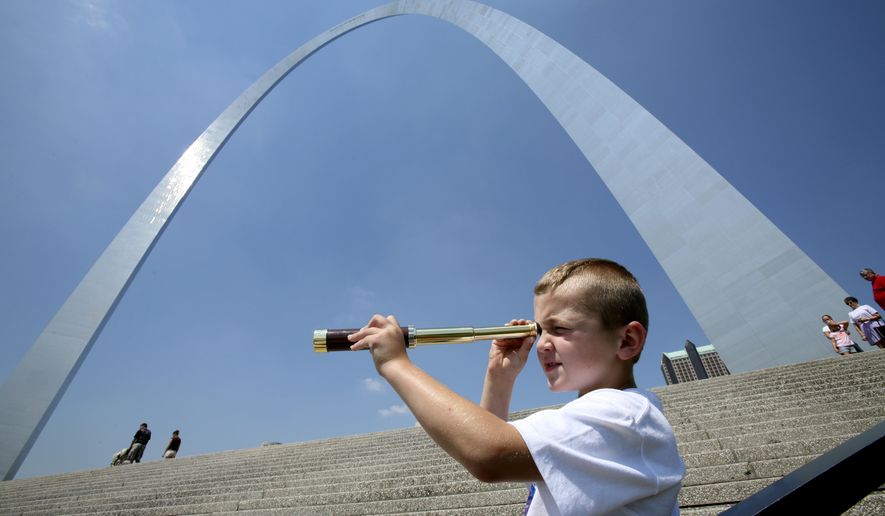With nary a nay, Congress has scrubbed Thomas Jefferson’s name from a park built to celebrate one of his life’s great achievements and the way it changed America.
The famous arch on the Mississippi River’s western bank in St. Louis anchors what has long been named the Jefferson National Expansion Memorial. On Thursday, however, a unanimous voice vote in the House sent to President Trump a bill to rename it Gateway Arch National Park. The bill passed the Senate without objection in December.
Those involved hasten to note that the act isn’t rooted in political correctness.
Instead, they say it’s a sound marketing scheme. Since hardly any Americans know the park’s name but practically every American knows the Arch, it is sensible to refer to the place by its most familiar landmark.
“This gives this national icon an updated and recognizable name,” Rep. Colleen Hanabusa, Democrat Hawaii, said during the House debate Monday.
The bill was introduced by the two senators from Missouri: Democrat Claire McCaskill and Republican Roy Blunt. The House version also had Republican and Democratic sponsors.
Robert Vogel, acting deputy director of the National Park Service, signaled the administration’s support in testimony to Congress in July.
“The name ’Jefferson National Expansion Memorial’ does not readily identify where the memorial is located or the fact that the key feature of the park is the Gateway Arch,” he told lawmakers. “Using ’Gateway Arch’ in the name of the site would make the name immediately recognizable to all citizens and future visitors to St. Louis.”
Indeed, increasing the number of those future visitors is more of a reason for the change than Jefferson’s parenting with Sally Hemings. In its heyday, the Arch drew 3.2 million people a year, but that number has fallen to 2.3 million for various reasons.
A name change and a private-public renovation to the tune of $380 million, with a ribbon-cutting ceremony set for July 3, are also part of this campaign.
“Not at all,” said Ryan McClure, communications director for the Gateway Arch Park Foundation, when asked if modern politics were behind the removal of a past political master.
“With this renovation, I think Jefferson’s role is highlighted even more than in the past. Jefferson’s vision is still recognized and honored in the park, and I don’t think this diminishes his role at all,” he said.
When the park was envisioned between the world wars, its primary booster, Luther Ely Smith, saw it as “a suitable and permanent public memorial to the men who made possible the western territorial expansion of the United States, particularly President Jefferson.”
The Gateway to the West refers to the Louisiana Purchase, the real estate deal engineered by Jefferson’s administration when European strongman Napoleon Bonaparte wanted money for war. With the stroke of a pen and pennies on the acre in 1803, Jefferson added 828,000 square miles to the U.S.
But much that came after that is also a part of the park. Explorers Meriwether Lewis and William Clark set off on their fabled journey from a spot beneath the arch. The park also holds the Old Courthouse where Dred Scott, whose name would sound above the din of America’s bloodiest battles, first sued for his freedom from slavery.
Much of this was in President Franklin Roosevelt’s mind when he signed an executive order creating the Jefferson National Expansion Memorial and when Congress gave its imprimatur in 1954.
In addition to famous names, Congress said in the chestier tones that Americans used to employ when talking about their history, the park would honor “the hardy hunters, trappers, frontiersmen, pioneers and others who contributed to such expansion.”
Some believe all this history will be lost in the name change. While relieved to learn that social justice storm troopers weren’t behind the change, Illinois lawyer David Shestokas, who has followed the name switch at his blog, wondered if something wasn’t being lost nonetheless.
“Why not call it ’Jefferson Gateway Arch National Park?’” he asked. “That’s what all this was supposed to be about in the first place because without Jefferson there is no Louisiana Purchase.”
• James Varney can be reached at jvarney@washingtontimes.com.




Please read our comment policy before commenting.